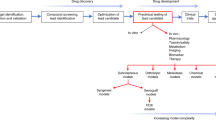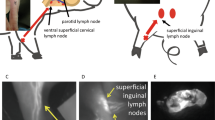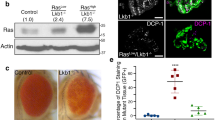Abstract
THE number of spontaneous neoplasms found in Amphibia1 and the success of Leono2,3 in chemically inducing tumours in newts uphold the view4 that Amphibia, like other vertebrates, are susceptible to tho occurrence of neoplastic growth.
This is a preview of subscription content, access via your institution
Access options
Subscribe to this journal
Receive 51 print issues and online access
$199.00 per year
only $3.90 per issue
Buy this article
- Purchase on Springer Link
- Instant access to full article PDF
Prices may be subject to local taxes which are calculated during checkout
Similar content being viewed by others
References
Balls, M., Cancer Res., 22 (in the press).
Leone, V., Tumori, 39, 420 (1953).
Leone, V., R.C. Ist. lombardo, B, 92, 220 (1957).
Schlumberger, H. G., and Lucké, B., Cancer Res., 8, 657 (1948).
Lucké, B., and Schlumberger, H. G., Physiol. Rev., 29, 91 (1949).
Breedis, C., Cancer Res., 12, 861 (1952).
Briggs, R. W., Nature, 146, 29 (1940).
Duran-Reynals, F., Yale J. Biol. and Med., 11, 613 (1939).
Skapier, J., Acta Un. Intern. Cancr, 6, 65 (1948–50).
Author information
Authors and Affiliations
Rights and permissions
About this article
Cite this article
BALLS, M. Methylcholanthrene-induced Lymphosarcomas in Xenopus laevis. Nature 196, 1327–1328 (1962). https://doi.org/10.1038/1961327a0
Issue Date:
DOI: https://doi.org/10.1038/1961327a0
This article is cited by
-
A review of the chemical induction of neoplasms in amphibia
Experientia (1964)
-
Benzpyrene-induced tumours in the clawed toad,Xenopus laevis
Experientia (1964)
Comments
By submitting a comment you agree to abide by our Terms and Community Guidelines. If you find something abusive or that does not comply with our terms or guidelines please flag it as inappropriate.



